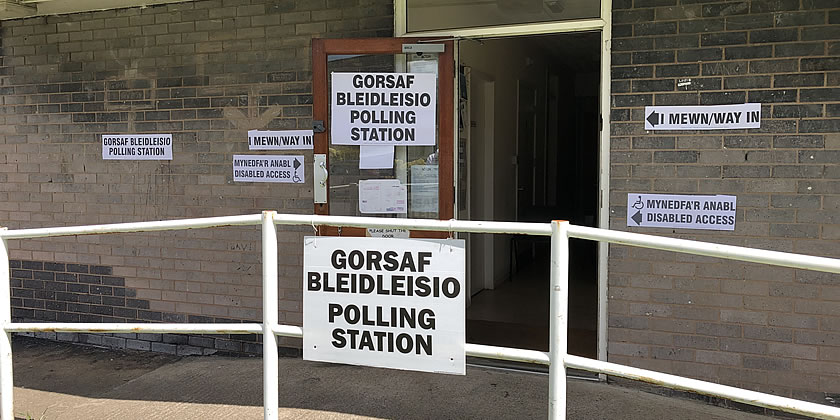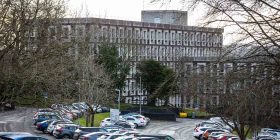Returning Officer explains monumental challenge of staging Covid-secure election

A returning officer who “couldn’t picture” holding Senedd elections three months ago has described the “monumental challenge” of staging this year’s Covid-secure poll.
Iwan Davies, chief executive of Conwy county council has been officiating over the area’s elections for 16 years and he described how Covid has changed this year’s preparations.
Mr Davies, who is presiding over Clwyd West and Aberconwy for Senedd constituency, regional and North Wales Police and Crime Commissioner votes, also gave an insight into the rigours of a role which largely is invisible to most people.
It’s not just a case of standing at a lectern and reading out numbers, as seen on TV.
The role carries the threat of criminal sanctions for both him and candidates and requires his attention throughout the year – not just during the election period.
However this year has been overshadowed by Covid and as recently as February he doubted the election could be held.
He said: “Three or four months ago I couldn’t picture us holding elections on May 6. Elections always are complicated but this was another level. Put the pandemic on top and it’s been a real monumental challenge.”
Mr Davies said new legislation from Welsh Government had also complicated this year’s polls.
He explained: “This time 16 and 17 year-olds voted for the Senedd elections but not the Police and Crime Commissioner election, so they needed two ballot papers but not the third.”
Across the two constituencies 99 polling stations were booked prepared, staff engaged and trained and ballots sent out to more than 100,000 ballot slips – a process which started around four months ago.
Mr Davies has two staff as returning officer who help him keep the electoral records up to date all year round.
Yet there are hundreds more staff who needed to be prepped for the big day and Covid made it even more onerous this year.
There were 99 presiding officers who managed each polling station, at least one poll clerk in every station managing the lists of electors and handing out ballots and most stations this year had a marshal, making sure we all voted safely and in line with coronavirus guidelines.
Presiding officers were tasked with keeping the flow of voters in a socially distanced manner and making sure order was kept.
They have the power to instruct a police officer to remove anyone causing a problem – a power not normally needed.
They’re then tasked with getting ballot boxes to a location within the county, before they’re transported to the count centre at the The Barn in Colwyn Bay on the morning of the tallying up of the vote.
The first job is to verify the ballot totals against the list of those handed out, against the ballot paper account.
Mr Davies said: “If the numbers in the box don’t correlate with the ballot paper account we ask them to check the numbers again.
“If we get the same number two or three times then we accept it. Because there are three different papers there’s always the chance the wrong paper will go into the wrong box.”
The counting process starts and it’s the returning officer’s job to adjudicate on spoilt ballots.
From there constituency votes are counted and he chats with candidates and their agents about the results.
He explained how recounts can be asked for but it’s up to him to adjudicate on their validity.
He said: “The rule is they can ask for a recount and I can refuse if I think it’s unreasonable – they need to give me a reason.
“The slight nuance on that, a party or candidate that doesn’t get many votes and isn’t going to win, might still ask for a recount especially if they’re on the cusp of having their deposit returned.
“To get your deposit returned you have to get 5% of the votes that are cast. They might need two votes to get their £500 back or £5,000 for the PCC election.
“I encourage counting agents and election agents to highlight to me during the count if they think there’s something going wrong.
“Even with the best run count if got down to around 25 between the candidates I would allow a recount – it depends on how close it is.
“Things can get a bit tense at 5am.”
This year has seen a “significant increase in postal votes” but he believes it won’t be long until modern technology plays a part in election processes.
“There’s a whole debate to be had about how elections should be run in the future,” he said.
“I do wonder how much longer this traditional, massively paper-based approach can continue.
“I think it’s only a matter of time before there’s a technology approach to elections.
“Of course there’s a need to make sure those who don’t have access to technology have exactly the same right to exercise their votes.”
Although he is a familiar sight at Senedd and county council elections, Mr Davies is not officially the returning officer for Westminster votes.
“In General Elections people like me are called the ‘acting returning officer’,” he revealed.
“Because technically the returning officers for Wales are the High Sheriffs for the two preserved counties of Clwyd and Gwynedd.
“So technically the returning officer for the general Election is the High Sheriff of Clwyd for us.”
There is a budget for all the work he does which pays for the staff, venues and posting of ballots.
He also receives expenses but with it comes the threat of legal action, as he can be prosecuted if something goes wrong with the count.
If there’s a data breach he can be investigated and censured by the information commissioner even if he was nowhere near what happened.
It’s a threat which hangs over all returning officers, all year round.
He is also responsible for making sure candidates observe electoral law, for which breaches can also be criminal offences.
Mr Davies said he would rather “work with police” and candidates unless there’s a “flagrant” rule breach.
Despite his wealth of experience the chance to be a part of history still gets his nerves tingling as election day approaches – and this year will be no exception.
He said: “I do get excited (about the counts). I say to the counters at the beginning ‘we’re making history tonight, we’re part of it’.
“A couple of times we’ve been parts of new constituencies and I’ve said ‘tonight we will be appointing the new MP for such and such a constituency’.
“Yes, it is historic. There’s a chance when I’m making the announcement it might be shown on TV from time to time, so you’ve got to make sure you get it as right as possible.
“But I’m really lucky. I have a great team with me and I rely on them. That’s what I have learned.”
By Jez Hemming – Local Democracy Reporter
Spotted something? Got a story? Send a Facebook Message | A direct message on Twitter | Email news@north.wales






